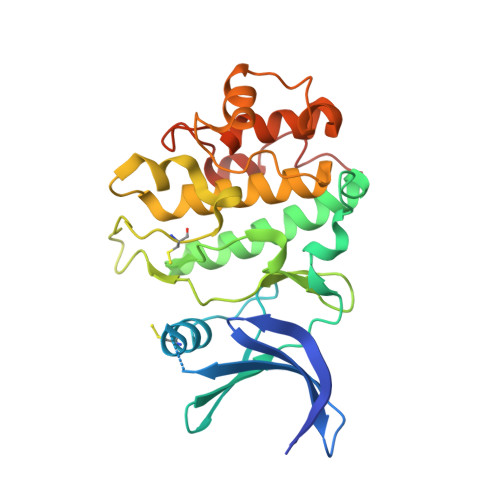Discovery of Checkpoint Kinase Inhibitor (S)-5-(3-Fluorophenyl)-N-(Piperidin-3-Yl)-3-Ureidothiophene-2-Carboxamide (Azd7762) by Structure-Based Design and Optimization of Thiophenecarboxamide Ureas.
Oza, V., Ashwell, S., Almeida, L., Brassil, P., Breed, J., Deng, C., Gero, T., Grondine, M., Horn, C., Ioannidis, S., Liu, D., Lyne, P., Newcombe, N., Pass, M., Read, J.A., Ready, S., Rowsell, S., Su, M., Toader, D., Vasbinder, M., Yu, D., Yu, Y., Xue, Y., Zabludoff, S., Janetka, J.(2012) J Med Chem 55: 5130
- PubMed: 22551018
- DOI: https://doi.org/10.1021/jm300025r
- Primary Citation of Related Structures:
2YDI, 2YDJ, 2YDK, 3PZE - PubMed Abstract:
Checkpoint kinases CHK1 and CHK2 are activated in response to DNA damage that results in cell cycle arrest, allowing sufficient time for DNA repair. Agents that lead to abrogation of such checkpoints have potential to increase the efficacy of such compounds as chemo- and radiotherapies. Thiophenecarboxamide ureas (TCUs) were identified as inhibitors of CHK1 by high throughput screening. A structure-based approach is described using crystal structures of JNK1 and CHK1 in complex with 1 and 2 and of the CHK1-3b complex. The ribose binding pocket of CHK1 was targeted to generate inhibitors with excellent cellular potency and selectivity over CDK1and IKKβ, key features lacking from the initial compounds. Optimization of 3b resulted in the identification of a regioisomeric 3-TCU lead 12a. Optimization of 12a led to the discovery of the clinical candidate 4 (AZD7762), which strongly potentiates the efficacy of a variety of DNA-damaging agents in preclinical models.
Organizational Affiliation:
AstraZeneca R&D Boston, 35 Gatehouse Drive, Waltham, Massachusetts 02451, United States. vibha.oza@gmail.com

















